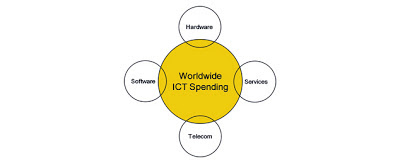Economic uncertainty surrounding the U.S. government sequester, European debt crisis and weakening GDP in China has resulted in volatile spending patterns across most segments of the market. According to the latest market study by International Data Corporation (IDC), as a result of the current economic climate, business technology spending was slightly below expectations in the second half of 2012 and first quarter of 2013.
IDC now projects worldwide IT spending growth of 4.9 percent this year in constant currency, down from the previous forecast of 5.5 percent growth — and representing a slowdown from the 5.6 percent growth recorded in 2012. As a result, IT spending will reach $2.06 trillion in 2013. Including telecom services, ICT spending will increase by 4.5 percent to $3.7 trillion.
So, what are the key trends that are shaping the updated global forecasts?
Deteriorating PC Shipments
The reduction in IDC’s overall forecast for 2013 is largely driven by rapidly deteriorating PC shipments since the second half of 2012. IDC now expects PC spending to decline by 3 percent in constant currency this year, representing a third successive year of declining PC revenues.
The shift to mobile devices remains a key driver for overall tech spending growth. Excluding mobile phones and tablets, worldwide IT spending increased by only 2.8 percent in 2012 and is forecast to grow by just 2.6 percent this year.
Worldwide spending on smartphones will increase by 17 percent in 2013 while tablet spending will grow by 32 percent. The combined growth rate for PCs and tablets, meanwhile, will remain stable in the range of 4-5 percent.
Cloud Services Cannibalizes Software and IT Services
Just as tablets are cannibalizing PC spending, so the growth of managed cloud services continues to cannibalize commercial software and IT services. Software spending in the U.S. grew slightly slower than forecast in 2012, and IDC has consequently reduced the U.S. software forecast to 6 percent growth for 2013 (from 7 percent).
IT services demand remains stable, but the pass-through from capital spending and software deployment remains tepid by historical standards. IDC now forecasts growth of 5.6 percent in worldwide software spending in 2013 (constant currency), and 3.8 percent in IT services.
Decline in Server Revenues
IDC’s assessment also suggests a decline in overall server revenues while storage infrastructure spending will cool somewhat after the major spending cycle of 2011/2012. IDC now projects 2.4 percent growth in worldwide storage hardware revenues this year, down from 6.1 percent growth in 2012.
Network infrastructure investment was strong in 2012, as many carriers invested in the deployment of LTE networks, but this will also cool in 2013. Service provider spending on network equipment will increase by 1.1 percent this year, compared to 5.8 percent in 2012. Enterprise network spending should remain more stable, projected to post growth of 6.8 percent.
The Global Networked Economy
Emerging markets are still the engines of growth for Worldwide IT spending, with strong trends continuing in markets such as India and Brazil in recent months. The weakest-performing geographies will be Western Europe and Japan, where slow economic growth is inhibiting IT spending while the U.S. market remains fragile in the context of political uncertainty.
“It’s all about the economy,” said Stephen Minton, Vice President at IDC. “Our surveys confirm that underlying demand for IT products and services remains strong, but that businesses are once again being forced to delay new projects or investments in the face of longer decision-making cycles and a lack of short-term visibility. This storm could pass quickly, if governments in the U.S., Europe, China and Japan succeed in steering their ships towards calm waters in the second half of the year.”
That being said, it’s the savvy forward-looking executive leaders who continue to invest heavily in business technology adoption. They see a window of opportunity to deploy productivity-enhancing applications and thereby make a quantum leap ahead of their conservative competitors that lack the strategic foresight to act boldly. This is the fundamental reason why ICT spending will reach significant levels in 2013.
